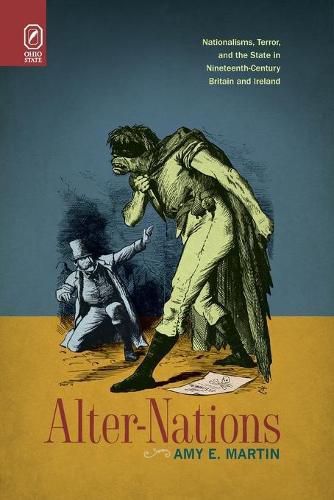Readings Newsletter
Become a Readings Member to make your shopping experience even easier.
Sign in or sign up for free!
You’re not far away from qualifying for FREE standard shipping within Australia
You’ve qualified for FREE standard shipping within Australia
The cart is loading…






This title is printed to order. This book may have been self-published. If so, we cannot guarantee the quality of the content. In the main most books will have gone through the editing process however some may not. We therefore suggest that you be aware of this before ordering this book. If in doubt check either the author or publisher’s details as we are unable to accept any returns unless they are faulty. Please contact us if you have any questions.
Alter-Nations: Nationalisms, Terror, and the State in Nineteenth-Century Britain and Ireland investigates how Victorian cultural production on both sides of the Irish Sea grappled with the complex relationship between British imperial nationalism and Irish anticolonial nationalism. In the process, this study reconceptualizes the history of modern nationhood in Britain and Ireland. Taking as its archive political theory, polemical prose, novels, political cartoons, memoir, and newspaper writings, Amy E. Martin’s Alter-Nations examines the central place of Irish anticolonial nationalism in Victorian culture and provides a new genealogy of categories such as nationalism
terror, and the state. In texts from Britain and Ireland, we can trace the emergence of new narratives of Irish immigration, racial difference, and Irish violence as central to capitalist national crisis in nineteenth-century Britain. In visual culture and newspaper writing of the 1860s, the modern idea of terrorism as irrational and racialized anticolonial violence first comes into being. This new ideology of terrorism finds its counterpart in Victorian theorizations of the modern hegemonic state form, which justify the state’s monopoly of violence by imagining its apparatuses as specifically anti-terrorist. At the same time, Irish Fenian writings articulate anticolonial critique that anticipates the problematics of postcolonial studies and attempts to reimagine in generative and radical ways anticolonialism’s relation to modernity and the state form. By so doing, Alter-Nations argues for the centrality of Irish studies to postcolonial and Victorian studies, and reconceptualizes the boundaries and concerns of those fields.
$9.00 standard shipping within Australia
FREE standard shipping within Australia for orders over $100.00
Express & International shipping calculated at checkout
This title is printed to order. This book may have been self-published. If so, we cannot guarantee the quality of the content. In the main most books will have gone through the editing process however some may not. We therefore suggest that you be aware of this before ordering this book. If in doubt check either the author or publisher’s details as we are unable to accept any returns unless they are faulty. Please contact us if you have any questions.
Alter-Nations: Nationalisms, Terror, and the State in Nineteenth-Century Britain and Ireland investigates how Victorian cultural production on both sides of the Irish Sea grappled with the complex relationship between British imperial nationalism and Irish anticolonial nationalism. In the process, this study reconceptualizes the history of modern nationhood in Britain and Ireland. Taking as its archive political theory, polemical prose, novels, political cartoons, memoir, and newspaper writings, Amy E. Martin’s Alter-Nations examines the central place of Irish anticolonial nationalism in Victorian culture and provides a new genealogy of categories such as nationalism
terror, and the state. In texts from Britain and Ireland, we can trace the emergence of new narratives of Irish immigration, racial difference, and Irish violence as central to capitalist national crisis in nineteenth-century Britain. In visual culture and newspaper writing of the 1860s, the modern idea of terrorism as irrational and racialized anticolonial violence first comes into being. This new ideology of terrorism finds its counterpart in Victorian theorizations of the modern hegemonic state form, which justify the state’s monopoly of violence by imagining its apparatuses as specifically anti-terrorist. At the same time, Irish Fenian writings articulate anticolonial critique that anticipates the problematics of postcolonial studies and attempts to reimagine in generative and radical ways anticolonialism’s relation to modernity and the state form. By so doing, Alter-Nations argues for the centrality of Irish studies to postcolonial and Victorian studies, and reconceptualizes the boundaries and concerns of those fields.